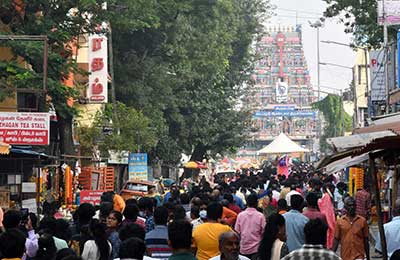Date: 04/01/2023
Relevance: GS-2: Indian Constitution—Historical Underpinnings, Evolution, Features, Amendments, Significant Provisions, and Basic Structure.
Key Phrases: Temple control and temple entry, State management of temples, Article 25(2)(b), Article 25(2)(a), Shirur Mutt judgment, Madras Hindu Religious and Charitable Endowments (HR&CE) Act, 1951.
Why in News?
- State management of temples is often justified as a way of ensuring access to temples for worshippers and archakas (priests).
- Regulating secular activities associated with religious practice can be traced to Article 25(2)(a) of the Constitution. Temple control legislation is purportedly justified by this Article.
Temple control and temple entry:
- Constitutional provisions:
- Article 25(2)(a) empowers the state to regulate “economic, financial, political or other secular activities which may be associated with religious practice”.
- Article 25(2)(b) empowers the state to enact laws “providing for social welfare and reform or the throwing open of Hindu religious institutions” to “all classes and sections of Hindus”.
- Hence, the issue of regulating secular aspects of religious practice is distinct from providing access to worship.
- This is why there are separate laws for temple control and temple entry. They co-exist; one does not depend on the other.
- The Shirur Mutt judgment (1954):
- Speaking for a unanimous bench of seven judges, the supreme court substantially obliterated the Madras Hindu Religious and Charitable Endowments (HR&CE) Act, 1951, terming the impugned provisions as “extremely drastic” in character.
- So violent were the provisions against religious faith that the then Advocate General of Madras stated that he “could not support the legality of these provisions”.
- Amendment Act:
- As a result of the judgment in Shirur Mutt, the legislature of the erstwhile Madras State enacted in 1954 an amendment Act with the purpose of removing the defects pointed out by the Supreme Court.
- Again, the Act was challenged in Sudhindra Thirtha Swamiar v. Commissioner, H.R.C.E. (1955) before the Madras High Court.
- This Act too was struck down as it suffered from the same defects as the original enactment.
- Orissa Hindu Religious Endowments Act:
- The Orissa Hindu Religious Endowments Act, 1939 also has the distinction of being struck down by the Supreme Court twice — first in Sri Jagannath v State of Orissa (1954) and then in Sadasib Prakash Brahmachari v. The State of Orissa (1956).
The effect of temple control legislation:
- Interference in religious affairs:
- In the guise of administering Hindu religious endowments, the state is trenching upon religious affairs.
- In Tamil Nadu temples cannot even conduct pujas as the state has depleted their income.
- Misappropriation of funds:
- The large-scale loot and plunder of temple resources at the hands of state officials would put to shame the colonial government.
- Such misappropriation of funds has been unearthed by temple activists and is now a matter of public record.
- Depletion of Income:
- As per the HR&CE policy note of 2012-13, Hindu temples own 4,78,545 acres of prime agricultural land; 22,599 buildings; and 33,627 ‘sites’ covering 29 crore sq. ft in area, whose estimated value would be almost ₹10 lakh crore.
- But the income realized by the Tamil Nadu HR&CE Department is a meagre ₹120 crore per year.
- This is less than the amount collected from temples as ‘administrative fee’.
- Forcible collection:
- In addition, the HR&CE Department collects hundreds of crores as ‘Common Good Fund’, though the courts have frowned upon such forcible collection.
- Land Usurp:
- As per the Department’s own admission, almost 47,000 acres of Hindu temple land have been usurped since 1986 under its “watch”.
- No proper records:
- The Tamil Nadu HR&CE Department does not even have records of its own executive notifications justifying its management of certain temples.
- The Madras High Court has lamented on this deplorable state of affairs brought to its notice by temple activists.
- On May 12, 2022, in a Public Interest Litigation seeking the removal of executive officers functioning in 47 temples without any orders of appointment, a Division Bench ordered the production of records.
- The Department has still not produced a single record to the court.
- No external Audit:
- Meanwhile, no external audit, as required by law, is being conducted for temples under HR&CE, and there are 1.5 million audit objections pending resolution since 1986.
Direction from the High court:
- In a scathing indictment of the HR&CE Department, the Madras High
Court in a 2021 judgment gave 75 directions covering:
- heritage conservation,
- safeguarding and realizing due income from temple properties,
- audit, the safety of vigrahams,
- appointment of trustees and
- formation of tribunals for speedy dispute resolution.
- Not one of them has been complied with.
Way Forward:
- A long line of judicial precedents, post the 42nd Amendment, emphasize that secularism means the state cannot mix with religion.
- Whatever brand of secularism people subscribe to, nothing justifies a state official dictating to a religious functionary how worship is to be conducted.
- There are suggestions that handing over the temples to the community will strengthen class hierarchies. The colonial law, the Religious Endowments Act (Act XX of 1863) has similar provisions for handing over religious institutions to society.
- The purpose is to involve the community, which has been excluded by the state. The objective is not to replace one bureaucracy with another.
- The participation of different stakeholders and the building of consensus among them will determine who will take over temples.
- However, the evils of the state perpetuated in the name of ‘secular management’ must be remedied first.
Source: The Hindu
Mains Question:
Q. Is the state's control and management of places of worship failing secularism in India? Critically Examine.






















